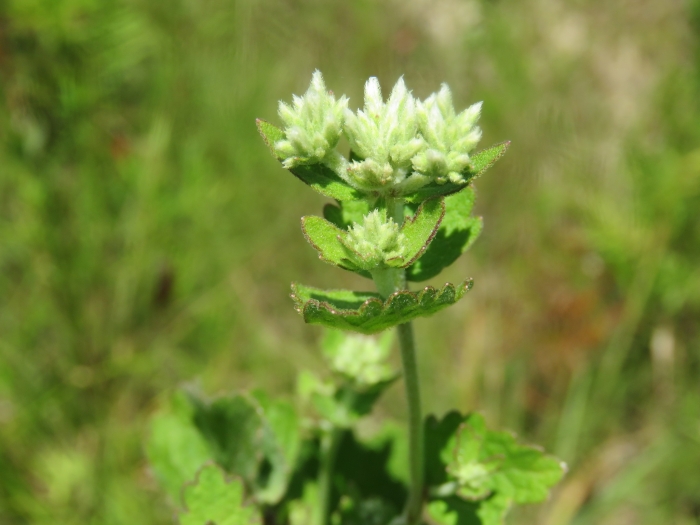Roundleaf Thoroughwort
(Eupatorium rotundifolium)
Roundleaf Thoroughwort (Eupatorium rotundifolium)
/
/

Laura Clark
CC BY 4.0
Image By:
Laura Clark
Recorded By:
Copyright:
CC BY 4.0
Copyright Notice:
Photo by: Laura Clark | License Type: CC BY 4.0 | License URL: http://creativecommons.org/licenses/by/4.0/ | Rights Holder: Laura Clark | Publisher: iNaturalist | Date Created: 2017-07-08T13:54:19-07:00 |


















































Estimated Native Range
Summary
Eupatorium rotundifolium, commonly known as Roundleaf Thoroughwort, is a perennial herb native to moist meadows, wet flatwoods, and the edges of freshwater marshes in eastern North America. It typically grows up to 100 cm (40 inches) tall, with stems produced from short rhizomes. The plant features ovate to round leaves with toothed margins, and its inflorescences are composed of numerous small white flower heads, each containing 5 disc florets but no ray florets. The flowers, which bloom in summer and fall, are not particularly showy but do attract a variety of pollinators.
Roundleaf Thoroughwort is valued for its naturalistic appearance and its ability to attract butterflies and other pollinators. It is often used in native plant gardens, rain gardens, and as part of naturalized areas. This species thrives in full sun to part shade and prefers consistently moist to wet soils with slow or medium drainage. While adaptable to a range of soil types, it does best in rich, loamy soils. Gardeners should be aware that Eupatorium species can spread aggressively by rhizomes and may require management to keep them contained. Additionally, they can be susceptible to powdery mildew in humid conditions. There are no widely recognized cultivars of this species, but its natural variability due to hybridization can offer a range of subtle differences in plant form and leaf shape.CC BY-SA 4.0
Roundleaf Thoroughwort is valued for its naturalistic appearance and its ability to attract butterflies and other pollinators. It is often used in native plant gardens, rain gardens, and as part of naturalized areas. This species thrives in full sun to part shade and prefers consistently moist to wet soils with slow or medium drainage. While adaptable to a range of soil types, it does best in rich, loamy soils. Gardeners should be aware that Eupatorium species can spread aggressively by rhizomes and may require management to keep them contained. Additionally, they can be susceptible to powdery mildew in humid conditions. There are no widely recognized cultivars of this species, but its natural variability due to hybridization can offer a range of subtle differences in plant form and leaf shape.CC BY-SA 4.0
Plant Description
- Plant Type: Herb
- Height: 2-4 feet
- Width: 1-2 feet
- Growth Rate: Moderate
- Flower Color: White
- Flowering Season: Summer, Fall
- Leaf Retention: Deciduous
Growth Requirements
- Sun: Full Sun
- Water: Medium, High
- Drainage: Slow, Medium
Common Uses
Bee Garden, Bird Garden, Butterfly Garden, Low Maintenance, Rabbit Resistant
Natural Habitat
Moist meadows, wet flatwoods, and the edges of freshwater marshes
Other Names
Common Names: Roundleaf Eupatorium
Scientific Names: , Eupatorium rotundifolium, Eupatorium teucrifolium, Eupatorium verbenaefolium, Eupatorium rotundifolium var. typicum, Eupatorium obovatum, Eupatorium verbenifolium var. saundersii, Eupatorium rotundifolium var. pubescens, Critonia elliptica, Eupatorium marrubium
GBIF Accepted Name: Eupatorium rotundifolium L.